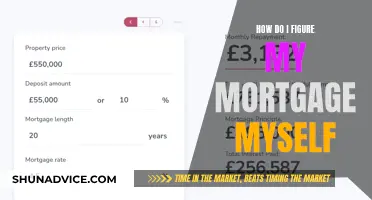
A mortgage note is a legal document that outlines the terms of a loan for purchasing a property. It is one of the many closing documents a borrower signs when closing on a home loan. The document includes the loan amount, interest rate, repayment schedule, and consequences of default. It is also known as a promissory note, which is a written agreement between a borrower and a lender to pay back a loan. If you have lost your mortgage note copy, you can request another one from your mortgage lender or servicer, or try to retrieve a copy through your local recording office. This article will provide information on how to find your mortgage note and what to do if you need a replacement.
| Characteristics | Values |
|---|---|
| What is a mortgage note? | A mortgage note is a legal document that outlines the terms of a loan for purchasing a property. |
| Who signs the mortgage note? | The mortgage note is signed by the borrower at the end of the home-buying process. |
| Who holds the mortgage note? | The original mortgage note is held by the mortgage lender or servicer until (or unless) the lender sells it on the secondary market. |
| What does the mortgage note include? | The mortgage note includes the loan amount, down payment, repayment term, interest rate, and additional conditions set by the mortgage lender. |
| What is the difference between a mortgage note and a mortgage? | The mortgage is the document that gives the lender collateral, which is usually the home. The mortgage note, on the other hand, outlines the terms of the loan. |
| What is the difference between a mortgage note and a promissory note? | A promissory note is a written agreement to pay back a loan and can be issued by any lending entity. A mortgage note is a specific type of promissory note for a mortgage loan. |
| Can a mortgage note be sold? | Yes, mortgage notes can be sold in the secondary mortgage note industry, providing financial flexibility and liquidity. |
What You'll Learn

What is a mortgage note?
A mortgage note is a legal document that outlines the terms of a home loan agreement between a borrower and a lender. It is one of the many documents signed when closing on a home loan and is also referred to as a "promissory note". The mortgage note includes key details such as the loan amount, down payment, repayment terms, monthly payment amount, interest rate, and any additional conditions or penalties set by the lender. This document is legally binding once signed by both parties and establishes the property as collateral for the loan.
The mortgage note is held by the mortgage provider or lender until the loan is fully repaid. In the case of a refinance, a new mortgage note is created and held by the new lender. Mortgage notes can be bought and sold on the secondary mortgage market, often to real estate investors who are attracted to the potential for passive income and relatively low risk. The buying and selling of mortgage notes do not affect the borrower's monthly payments or loan terms.
It is important for borrowers to carefully review the mortgage note before signing to ensure that all terms of the agreement are correctly recorded. This document can be used as evidence in foreclosure proceedings, where the lender has the right to take possession of and sell the property if the borrower fails to make payments as agreed.
If a borrower loses their copy of the mortgage note, they can request a new one from their lender or servicer, and it is recommended to store this important document in a secure place.
Checking Your Mortgage Balance with Santander: A Step-by-Step Guide
You may want to see also

Where can I find a copy?
A mortgage note is a legal document that establishes your responsibility to repay a home loan and gives the lender the right to foreclose on your property if you don't pay the mortgage as agreed. It is a two-part document consisting of a promissory note and a mortgage. The promissory note is the promise to pay, which you sign at closing, and the mortgage establishes the house as security for your loan.
You should receive a copy of your mortgage note when you close on a house. This is included in your settlement document package or house closing documentation package. If you need a new copy, you can contact your lender or local county office. You may have to pay a small fee for copies.
If you don't know who the title company or attorney was that handled the settlement, you can try to find this information in public records. You can also pull up the deed in public records, which sometimes contains the information of the title company that prepared it. This is another party that you can reach out to for a copy of the note.
If you have a copy of the mortgage statement, you can provide that and tell the lender they can contact them to request verification with your signed authorization form.
Asking for a Mortgage Testimonial: What's the Best Approach?
You may want to see also

What is the difference between a mortgage and a mortgage note?
A mortgage note is one of the many closing documents a borrower signs when closing on a home loan. It is a legal document that outlines the terms of the agreement between the borrower and lender, including the monthly payment amount, loan terms, and any penalties that can be assessed. It also states that the property is being used as collateral for the loan.
The mortgage, on the other hand, is the document that secures the loan. It gives the lender the right to take possession of and sell the property if the borrower fails to repay the loan as agreed upon in the mortgage note. The mortgage is also referred to as a deed of trust in some states.
While the mortgage note is a security instrument that can be bought and sold on the secondary mortgage market, the mortgage itself cannot be sold or traded. The mortgage note is held by the mortgage lender or servicer until the loan is paid off, at which point the original note is returned to the borrower, usually with a stamp or mark indicating that it has been satisfied.
It is important to note that the terms "mortgage note" and "mortgage" are sometimes used interchangeably, which can be confusing. However, it is essential to understand the difference between the two and to carefully review the terms of both documents before signing to ensure a clear understanding of the obligations and risks involved in the home loan process.
Managing Mortgage Expenses: Tracking and Recording Costs
You may want to see also

What is the difference between a mortgage note and a promissory note?
When purchasing a property, it is common to take out a loan. This loan is often referred to as a "mortgage". However, the term "mortgage" is very specific and includes more than just the mortgage itself. In fact, when you take out a loan to buy a home, you usually sign two primary documents: a mortgage (or deed of trust) and a promissory note.
A mortgage is a contract signed with the lender that provides security (collateral) for a loan. The mortgage gives the lender the right to sell the property through foreclosure and use the proceeds to recoup its money if you fail to make the loan payments. It outlines the borrower's obligations and the lender's rights. It is filed in the public records of the county where the property is located and serves as notice that the lender has a lien on the property.
A promissory note, on the other hand, is a written agreement or contract separate from the mortgage. It is a promise to repay the borrowed amount, usually with monthly payments. It contains the terms for repayment, including the interest rate, repayment schedule, and loan amount. The note gives the lender the right to collect on the loan if you don't make payments. It is not recorded in the county land records but is kept with the lender. Only those who sign the promissory note are legally responsible for repaying the lender.
In summary, the key differences between a mortgage and a promissory note are the purpose and contents of the document. A mortgage creates a security interest in the property (a lien) for the lender, while a promissory note serves as the borrower's written promise to repay the debt. The mortgage describes the borrower's responsibilities for the property and the lender's rights in the event of default, while the promissory note outlines the loan terms, including the interest rate and repayment schedule.
Becoming a Mortgage Advisor: UK Pathways and Qualifications
You may want to see also

Can I sell my mortgage note?
Yes, you can sell your mortgage note. When you take out a mortgage loan, you sign a mortgage note, which is a legal document outlining your agreement with your mortgage lender. It includes the loan amount, down payment, repayment term, and additional conditions set by the mortgage lender. The mortgage note is signed by borrowers at the end of the home-buying process, stating their promise to repay the money.
The mortgage note is different from the mortgage itself, which is the document that secures the loan. The mortgage gives the lender the right to take possession of your home and sell it if you fail to repay the loan. The mortgage note, on the other hand, is a security instrument that can be sold on the secondary market to investors. This is often done quickly after closing, and your note may be sold multiple times until you pay off the loan. However, this will not impact your monthly payment or any other terms of the loan.
If you are considering selling your mortgage note, it is important to understand the process and the intricacies involved. You can sell your note on the secondary market to investors, but you will need to structure the note with favourable terms to attract buyers. You may also want to consult with an experienced real estate attorney to ensure a smoother transaction and a more favourable outcome. Obtaining multiple quotes for your mortgage note can help you maximise the potential sale value, and providing proof of consistent payments can enhance the perceived value of your note.
Disputing Mortgage Debt: Know Your Rights and Take Action
You may want to see also
Frequently asked questions
A mortgage note is a legal document that outlines the terms of a loan for purchasing a property. It is signed at the end of the home-buying process and includes the loan amount, repayment terms, interest rate, and additional conditions set by the mortgage lender.
The mortgage is the document that secures the loan and gives the lender the right to take possession of and sell the property if the borrower fails to repay. A mortgage note, on the other hand, is a promise to repay the loan and outlines the terms of the agreement.
As a borrower, you will receive a copy of your mortgage note at closing. If you lose this copy, you can request another one from your mortgage lender or servicer, or try to retrieve a copy through your local recording office.
Yes, you can sell your mortgage note to buyers in the secondary mortgage note industry. This allows you to convert long-term payment streams into a lump sum of cash, providing financial flexibility.
A mortgage note will include the loan amount, down payment, repayment terms, interest rate, and any additional conditions set by the lender. It will also specify whether the loan is a fixed-rate or adjustable-rate mortgage.







